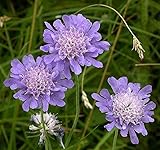Table of Contents
The name of the field scabious plant comes from the Latin word scabies (which means, precisely, scabies). From the Middle Ages onwards, it has been used to treat diverse skin afflictions, including scabies and leprosy.
- Brand:Unbranded, Country Of Manufacture:United States
- Model:flowers, Type:Seeds
- Country/Region Of Manufacture:United States, Plant Form:Seed
The root of the field scabious plant seems to end abruptly a few centimeters below the stem. According to the legend, the devil, angry at discovering this plant’s medicinal virtues, bit the root off.

Field Scabious Scientific Facts
- Other names: Scabiosa succissa L.
- French: Scabieuse.
- Spanish: Escabiosa mordida.
- Environment: Common on meadows and sunny slopes all over Europe. It can be found in mountainous, warm regions of South America.
- Description: Vivacious plant of the Dipsacaceae family, growing up to 1.2m high. It has blue or violet flowers, hemispheric, plenty of seeds, and a pleasant soft aroma.
- Parts of the plant used medicinally: The root, the leaves, and the flowers.
Healing Properties and Indications

The whole plant contains glycoside (scabioside), saponins, mineral salts, and potassium. The root is especially rich in tannin. When externally applied, it has expectorant and depurative (because of its content in saponins) properties. It is used in the following cases, combining both internal and external applications:

- Skin lesions, especially those accompanied by itching, such as scabies, but also for herpes, ringworm, and eczema. We recommend combining internal and external use (infusion) (compresses on the skin) to improve effectiveness.
- Bronchitis and asthma, since it thins bronchial secretions and eases expectoration. In this case, we recommend you take the infusion and apply hot compresses on the chest.
- Depurative treatments, because of the mild depurative, stimulating, and also sudorific properties of this plant.
How to use Field Scabious
- Internal with 50-60g of dry flowers, leaves, and roots per liter of water. Drink three or four cups daily.
- Compresses with the same infusion are used internally. Apply them hot on the affected area, combining them with internal applications (infusion) to enhance their effects.
Frequently Asked Question
What are the primary medicinal properties?
The plant is traditionally recognized for its anti-inflammatory, diuretic, and expectorant properties. It has been used in herbal medicine to treat skin conditions coughs, and as a diuretic to increase urine output.
How can field scabious be used to treat skin conditions?
The plant has been used in traditional remedies to heal skin ailments such as eczema, psoriasis, and scabies. It’s typically applied topically as a poultice or infused oil to soothe inflammation and promote healing.
Can it help with respiratory issues?
Yes, field scabious has expectorant properties, making it beneficial in treating coughs and other respiratory problems. Herbal teas made from flowers and leaves can help to loosen phlegm and ease breathing.
Is there any scientific research supporting the medicinal use of field scabious?
While traditional use provides a basis for its medicinal properties, scientific research on field scabious is limited. Some studies have investigated its anti-inflammatory and antimicrobial effects, but more research is needed to support these uses conclusively.
How is field scabious prepared for medicinal use?
Field scabious can be prepared in several ways, including as a tea, tincture, or poultice. The leaves and flowers are often infused in oil or applied directly as a poultice for skin conditions. A tea made from dried flowers and leaves is commonly used for internal health issues like coughs.
Are there any side effects or contraindications associated with field scabious?
While generally considered safe when used appropriately, field scabious can cause allergic reactions in some people, particularly those sensitive to plants in the Dipsacaceae family. Check with a healthcare specialist prior to starting any new herbal remedy.
Can field scabious be used during pregnancy and breastfeeding?
Due to a lack of scientific evidence on its safety, pregnant and breastfeeding women should avoid using field scabious as a precautionary measure.
How does field scabious compare to conventional medicines for skin conditions?
While field scabious has been used traditionally for skin conditions, it should not replace conventional medicines, primarily for severe cases. It may be a complementary treatment, but always consult a healthcare provider for advice tailored to specific health needs.
Where can the plant be found, and how is it harvested for medicinal use?
Field scabious grows in meadows, grasslands, and open forests across Europe and Asia. For medicinal use, the flowers and leaves are harvested during the blooming season, typically in late spring to summer, and dried for later use.
How can one ensure the sustainable use of field scabious in herbal medicine?
Sustainable use involves responsible harvesting practices, such as taking only a tiny portion of plants from a given area, avoiding rare or endangered populations, and cultivating field scabious in a garden setting to reduce wild harvesting pressures.
DISCLAIMER: All content on this website is presented solely for educational and informational objectives. It would be best to not rely on the information provided as a replacement for advice, diagnosis, or treatment from a qualified medical expert. If you are pregnant, nursing, or have any preexisting medical concerns, you should talk to your doctor before using any herbal or natural medicines.
REFERENCES
- George D. Pamplona-Roger, M.D. “Encyclopedia of Medicinal Plants.” George D. Pamplona-Roger, M.D. Encyclopedia of Medicinal Plants. Ed. Francesc X. Gelabert. vols. 2 San Fernando de Henares: Editorial Safeliz, 2000. 731. Print.
- Botanical Databases: http://www.missouribotanicalgarden.org
- Royal Botanic Gardens, Kew http://www.kew.org
- PubMed: https://pubmed.ncbi.nlm.nih.gov is a valuable resource. You can search for “Knautia arvensis” to find relevant studies.
- Plants for a Future: http://www.pfaf.org/user/Plant.aspx?LatinName=Knautia+arvensis.
- Herbal Resource Websites: http://www.herbwisdom.com
Last update on 2024-07-25 / Affiliate links / Images from Amazon Product Advertising API

